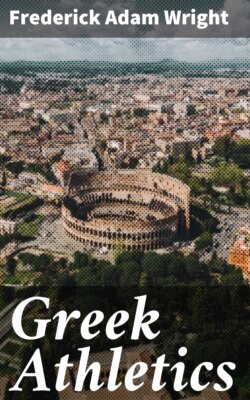Читать книгу Greek Athletics - Frederick Adam Wright - Страница 3
PREFACE
ОглавлениеIN a previous volume[A] an attempt was made to set out the principles followed by the Greeks in the three sister arts of acting, music, and painting; and to show how in some respects we have failed to improve upon their practice. It is perhaps doubtful whether the mass of our countrymen will ever take a very deep interest in the laws that govern the right use of colour, sound, and gesture; and even if our inferiority in art were proved, it is probable that the position would be regarded with equanimity.
But as regards athletics the case is different; and it is with some hesitation that in this book, after giving a brief account of Greek gymnastics and physical training, I have ventured to raise the question whether Greek systems of bodily culture were not in some ways superior to ours, and whether on the whole the Athenians of the fifth century b.c. were not a finer and a healthier people than are the Englishmen of to-day.
Before the year 1914 such doubts might never have presented themselves. But one of the many unpleasant truths that the War revealed was that the physical condition of our average middle-aged citizen was very far from being what it should be. Indeed, anyone whose business it was then to examine recruits, if he was at all familiar with the work of Greek sculptors, must often have noticed with positive pain the difference that was apparent between the figure of the typical Greek athlete and the figure of the typical English town-dweller.
The reasons for this poverty of physique were manifold—city life, alcohol, nicotine, sedentary occupations, unsuitable food among the most frequent—but there was one that overshadowed all the rest, a complete ignorance of the structure and functions of the human body. Accompanying this ignorance nearly always came an utter lack of acquaintance with the elementary principles of gymnastics. There were very few men who did not take a passionate interest in the progress of some football team, and there were equally few who had ever given any intelligent thought to their own physical condition.
Games have certainly been of immense value to modern England, and we have succeeded in making of them a real instrument of moral education. On the cricket and the football field our national qualities of individual initiative and cheerful obedience have been developed, the virtues of courage, endurance, and self-control fostered. But the average man to-day is inclined to take games too seriously, and to the competitive element in them he attaches an altogether absurd importance. In cricket, football, or tennis it really makes little difference which side wins, as long as all the participants get their due share of exercise. The true object of a game is not to secure runs or points or goals, but rather to develop and increase the strength of every part of our body.
On the other hand, gymnastics, in their widest sense, are not taken seriously enough. It is the duty, and it should be the pleasure, of every man and woman amongst us to make themselves as healthy and as beautiful as Nature meant them to be. For this purpose the playing—not of course the mere watching—of games has a definite value, but it does not take the place of a properly devised system of gymnastic exercises. Knowledge of the right methods is here of the first importance, and I therefore dedicate this book to our real experts in physical science, the gymnastic instructors of His Majesty’s Army.
